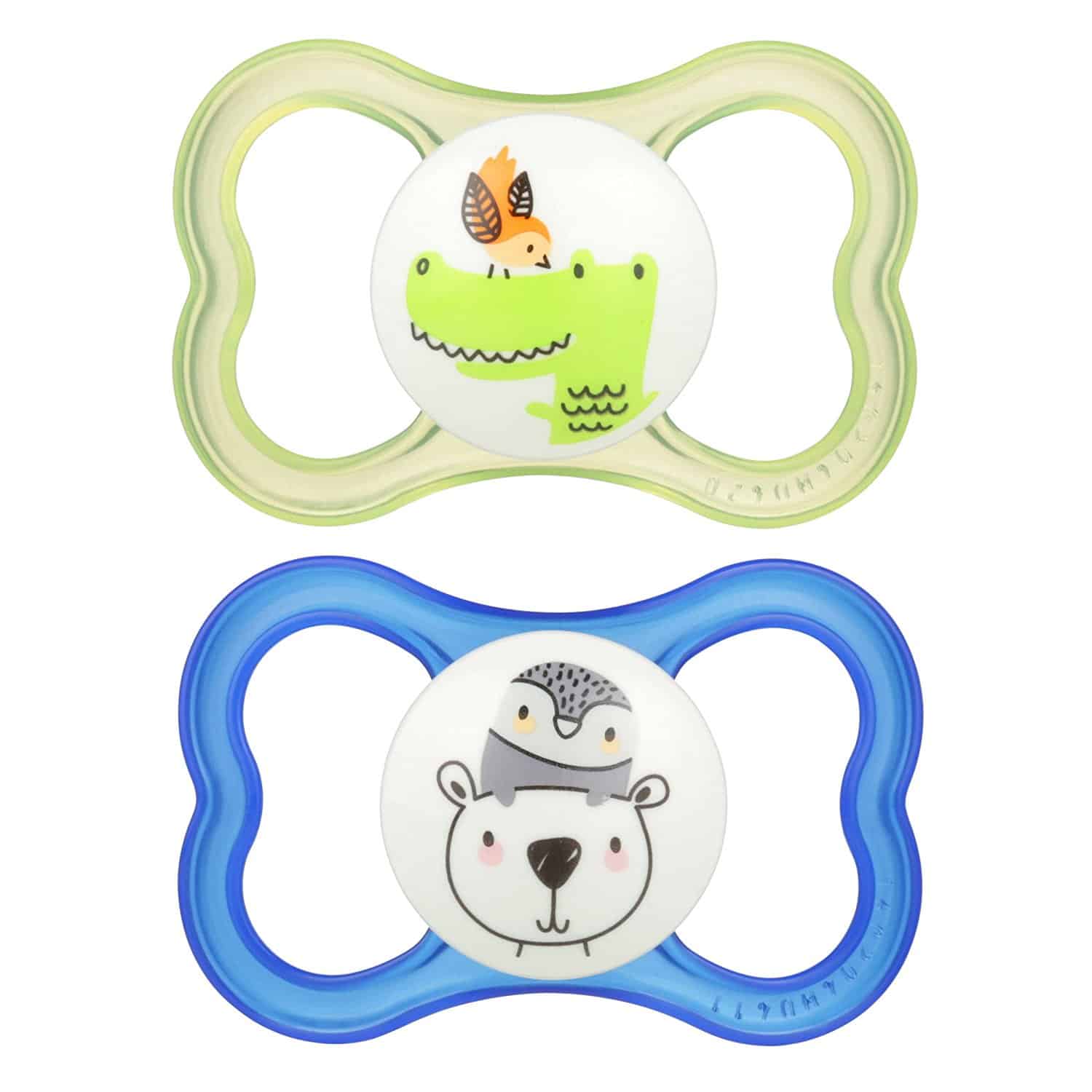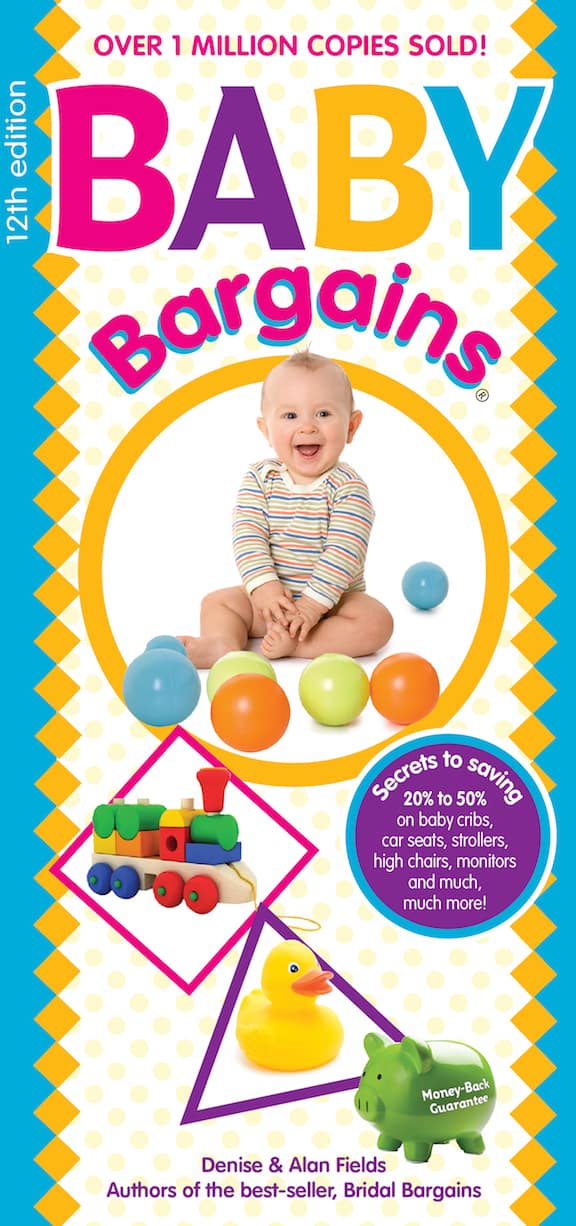Best Pacifier Overall: Philips Avent Soothie
The best pacifier should mimic a human nipple, so as not to interfere with breastfeeding. They should also be easy to clean. Because pacifiers have been implicated in recent safety recalls, we look for pacifiers made by reputable brands that have a solid track record in this category.
The Soothie hits all the right notes: it works well for newborns and young infants trying to establish breastfeeding as well as for older babies to provide some protection against SIDS (Sudden Infant Death Syndrome; see below discussion on pacifiers and SIDS). Here’s more:
What We Liked
• One piece construction. In our opinion, these are safer than pacifiers made up of two or more parts.
• Popular with lactation consultants. These pacifiers do not interfere with breastfeeding (although you should establish breastfeeding first before using any pacifier).
• Silicone (no latex) can be sterilized. Made of sturdy, hospital-grade silicone with no latex or BPA, you can sterilize Soothies or put them in the dishwasher.
• Good brand track record. Soothies are made by Philips Avent, which has a solid safety track record in this category. The brand has no safety recalls for pacifiers in the past 10 years, as of this writing.
What Needs Work
• Some babies don’t like the straight nipple. In that case, we’d go for an orthodontic shaped nipple (see our picks for that in this article).
• May be too big for smaller newborns. We didn’t see a problem with this in our testing, but we see the point.
• Could be cuter. Yes, other pacifiers look cuter in pictures.
Best Pacifier Made in Europe: BIBS BPA-Free Natural Rubber Baby Pacifier
Although this pacifier has been sold in Europe for 40 years, BIBS is relatively new here. We were impressed with this pacifier in our testing—parents and babies loved it. Made in Denmark, BIBS is made of natural latex (rubber).
A brief word on rubber pacifiers: a small number of kids have allergies to latex. According to the Mayo Clinic, “latex allergies are more commonly found in children who have had many surgeries and children with spina bifida or urologic problems.”
Another key point: “children with allergies to certain common foods are more likely to have latex allergies, because both the foods and latex may have some of the same proteins.” The take-home message: if you have a history of food allergies in your family, you may want to talk with your doctor before trying a rubber/latex pacifier like BIBS.
Here’s more on why we recommend BIBS pacifiers:
What We Liked
• Made in Denmark. We thought the quality of these pacifiers was excellent.
• No BPA, PVS or phthalates.
• Three different sizes. 0-6months. 6-18 and 18-36 months.
• Gender neutral colors. We know this is a small point, but you will take many pictures with this pacifier—it might as well look good!
What Needs Work
• Rubber expands over time. BIBS suggest replacing the pacifier every two months.
• Not uniform in size. The pacifiers we ordered had slightly different sized nipples, even though they were the same size category. This wasn’t a safety concern, but a result of the natural materials used in manufacturing.
• May be too large for smaller babies.
• Latex allergy warning! These pacifiers are made of pure rubber/latex! Although not common, a few babies do have allergies to latex. Talk with your doctor if you have concerns before trying this pacifier.
Best Orthodontic Pacifier: NUK Orthodontic Pacifier
There are two basic kinds of a pacifiers: straight (like the above two recommendations) and orthodontic. Orthodontic pacifiers are shaped more like mom’s nipple. When used properly (they must be oriented correctly), Orthodontic pacifiers are preferred by dentists we interviewed.
Reminder: these pacifiers are designed to be used for babies 24 months and under. Yes, we recommend giving up the pacifier earlier than that, but we know the habit is hard to break.
Here’s more on why NUK pacifiers made our recommended list:
What We Liked
• Cute designs help you determine which end is up. That’s important, as orthodontic pacifiers should be used correctly (not upside down).
• Dishwasher safe (in top rack). The silicone nipple is excellent in quality.
• Size works well for newborns or smaller babies.
• Package includes two regular and one glow-in-the-dark pacifier. If you’ve ever searched for a pacifier at 2am, you’ll understand why that is helpful!
• Affordable.
What Needs Work
• Water can get into the nipple. And that can lead to bacterial growth.
• Mouth guard can leave a ring on baby’s face. This isn’t a safety hazard, but it disturbs folks, naturally!
Best Parent Favorite: MAM Sensitive Skin Pacifiers
Parents we interviewed rave about MAM’s pacifiers and we agree: these are excellent orthodontic pacifiers. They would be a strong contender if you don’t like NUK’s pacifiers. Here’s more:
What We Liked
• Great for older babies.
• Light weight and lots of colors.
• Includes one regular and two glow-in-the-dark pacifiers.
What Needs Work
• Pricey.
• Must make sure it is used in the correct orientation. This is true for all orthodontic pacifiers, of course!
Why Trust Us
We’ve been rating and reviewing baby products like pacifiers since 1994. In addition to hands on inspections of pacifiers, we have also interviewed pediatrician and pediatric dentists. We also evaluate consumer reviews posted online, as well as our own message boards. Here’s another key point: we don’t take money from the brands we review. No free samples, no sponsors, no “partnerships.” Baby Bargains is your independent and unbiased source for expert baby gear reviews. We’ve been writing and reviewing baby gear since 1994. Yes, that long!
How we picked a winner
We evaluate pacifiers with in-depth inspections, checking models for safety and quality. We interview experts like pediatricians, lactation consultants and pediatric dentists to get expert advice on the best pacifiers that won’t interfere with breastfeeding or cause dental problems. We also gather significant reader feedback (our book, Baby Bargains has over 1 million copies in print), tracking pacifiers on durability and baby preference. Besides interviewing parents, we also regularly talk with retailers of nursery products to see which brands are most trustworthy and other key quality metrics.
7 Things No One Tells You About Buying A Pacifier!
1. Wait till breastfeeding is well established (at least four to seven days) before introducing a pacifier.
Lactation consultants tell us you don’t want to confuse a newborn with a pacifier, so skip the pacifier for at least four days after birth while you try to establish good breastfeeding habits. If you’ve never breastfed before, you may not realize that it can be rather difficult at first. Breastfeeding may be a natural process, but it requires some skills on both your and your baby’s part. So don’t set yourself up for failure by confusing your baby with a pacifier at the outset. Don’t worry, babies will still take that paci later.
2. Pacifiers can offer some protection against SIDS for the first six months to one year of life.
According to our in-house pediatrician and co-author of the Baby 411 book series, Dr. Ari Brown, pacifiers can greatly reduce the risk of Sudden Infant Death Syndrome (SIDS). A variety of studies, including a metadata study that looked at seven independent studies and results, have concluded that pacifiers can reduce the risk of SIDS “particularly when placed for sleep.”
3. Get rid of pacifiers early.
Pediatricians, the American Academy of Pediatrics and pediatric dentists all agree: get rid of the pacifier before or by one year of age at the latest. The risk for SIDS is greatest during the first six months of life, with the chances trailing off after a baby is one of year age. Why get rid of a pacifier after your baby turns one if your baby loves it? Let’s talk about that next.
4. Speech delays and orthodontic damage.
Your baby needs language skills sooner than you think. Pacifier use after one year of age can cause speech delays. Although research on this subject is inconclusive, babies with pacifiers tend to grunt and point more to communicate—and some can miss speech or language developmental milestones, according to pediatricians we interviewed.
What about damage to teeth or your baby’s jaw? Studies show pacifier use after age two can cause orthodontic problems. And that can mean a big orthodontist bill down the road. Bottom line: give up the pacifier BEFORE one year of age.
5. Extended use of pacifiers can lead to ear infections.
According to Dr. Ari Brown, co-author of Baby 411 and a practicing pediatrician, “pacifiers are a known risk factor for ear infections.” Our advice: use pacifiers at nap and bedtime only for the first six months to a year.
6. Don’t turn that orthodontic paci upside down.
Orthodontic pacifiers like those made by NUK and MAM have an up side and a down side. See below for examples. Don’t allow your baby to use her orthodontic paci upside down, which leads baby to chew the pacifier. Then, when you’re breastfeeding, he just might start chewing on you! Ouch! You can tell up from down by either the pattern on the pacifier or by the notch some pacifiers have on the top.
MAM pacifiers usually have pictures on their exterior button so you can see which way is up. Another clue: the tip of the nipple should point slightly upward to the top of baby’s mouth.
NUK has a curved upper edge to fit under baby’s nose. This notch helps you figure out which way is up.
7. It’s easier to break a pacifier habit than a thumb or finger sucking habit.
Throughout this whole discussion, you may have been thinking: “I hope my baby just sucks his thumb. That’s so much easier than worrying that the binky will fall out in the middle of the night.”
Yes, but . . . you knew there was a “but.” Pediatric dentists note that getting rid of the paci is a lot easier than stopping thumb sucking. After all, baby has her thumb all the time. But a binky can be “lost” when you want to get rid of it.
Children who continue to use a pacifier or such a thumb past two years of age risk serious damage to their teeth. Expensive orthodontia may be required, and in some severe cases, surgery.
Talk to your pediatrician if you have a child addicted to thumb or finger sucking for comfort and stress relief. They have tried and true methods to help your child stop without traumatizing her.


 We obsess over baby gear . . . so you don’t have to. Baby Bargains has one mission: help you find the best gear for your baby with unbiased reviews by experts with 20 years of experience. At prices that don’t break the bank. When you purchase a product from links on this site, we make a small affiliate commission. Learn more
We obsess over baby gear . . . so you don’t have to. Baby Bargains has one mission: help you find the best gear for your baby with unbiased reviews by experts with 20 years of experience. At prices that don’t break the bank. When you purchase a product from links on this site, we make a small affiliate commission. Learn more 
